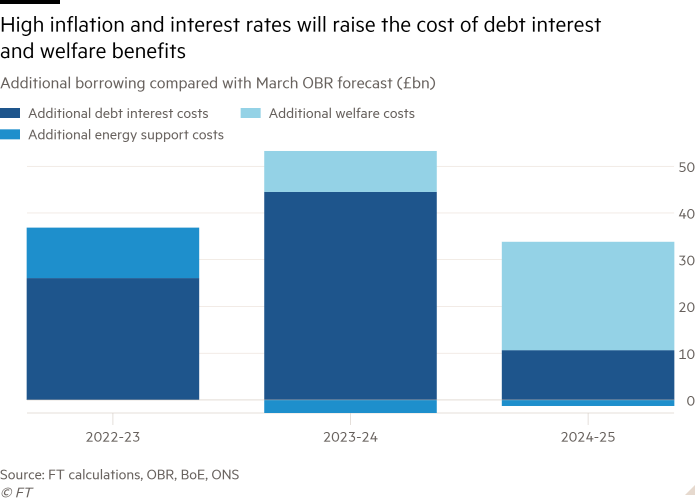The winner of the Conservative party leadership contest will face huge additional costs of servicing the nation’s debt and paying social security benefits as a result of rising inflation and interest rates, according to Financial Times calculations.
The estimates, which are an update to the Bank of England’s previous official inflation forecast in March, show that the UK’s debt and welfare payments bill soaring by more than £50bn next financial year.
The findings forecast that debt service costs are likely to almost double next year from £50bn to £95bn because £500bn of the UK’s public debt is linked to the consumer price index.
That bill falls as inflation comes down, but is replaced by higher social security benefits, which are also linked to prices, and are set to be £23bn higher every year by the time of the next election.
These payments will leave the new Tory leader hoping that tax revenues remain strong, helped by high inflation, at a time when the BoE thinks the economy will slide into recession.
In March, the Office for Budget Responsibility said that ministers would meet their own fiscal rules with £30bn headroom to spare in 2024-25. But officials close to the Treasury and OBR say more severe forecasts will be laid bare by the fiscal watchdog by the time the new prime minister takes office.

So far in the leadership campaign, both candidates have based tax and spending decisions on the March forecasts, not taking the big downgrade to growth and higher inflation and interest rates into account.
The UK economy shrank 0.1 per cent in the second quarter, reflecting the cost of living crisis starting to hurt households across the country.
Paul Johnson, director of the Institute for Fiscal Studies, said that with inflation driving up welfare and interest costs, “the new prime minister will face a pretty difficult public finance situation”.
The figures would be an underestimate of the public finance problem for Rishi Sunak or Liz Truss if the latest Goldman Sachs forecasts for inflation are fulfilled. The investment bank said on Friday that following the latest estimates of energy bills, CPI inflation was likely to peak at 14.4 per cent at the start of 2023.
The dire public finances will also be problematic for Sunak’s team because they will undermine his campaign’s shift from stressing difficulties with the nation’s debt to promising future tax cuts.
Professor Charlie Bean, former OBR committee member, said the pressures on the public finances meant that the permanent tax cuts promised by Truss were “irresponsible”.
“It’s sensible to run a large temporary deficit at the moment,” he said. “We’ve had a shock, which we hope will be temporary, but Liz Truss is thinking of permanent reductions in the tax burden and it’s a pretty open question whether £30bn of headroom is still there.”
Some economists close to the Truss campaign think that there is a need for more borrowing for lower taxes and this is the best policy at a difficult time for the UK economy.
Tim Pitt, a former adviser to Philip Hammond when he was chancellor, said that with public services under severe pressure, “the new chancellor will be in for a sharp shock this autumn as they try to keep the public finances on a sustainable path”.
Julian Jessop, an independent economist, said that people should not be concerned about more borrowing as long as debt remained under control in the medium term. “I’m less worried if headroom disappears against fiscal targets that don’t make a lot of sense,” he said.
Labour’s shadow chancellor Rachel Reeves said that high inflation required “real action”.
“That’s why the government must close the loopholes in the windfall tax on oil and gas producers, who are making record profits, to fund better cost of living support for the country,” she added.
